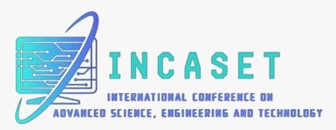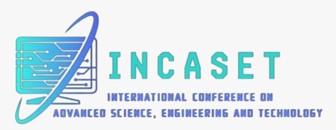
International Conference on Advanced Science, Engineering and Technology (INCASET) 2024
Bayou Lagoon Park Resort, Melaka, Malaysia
21st - 22nd December 2024 (Hybrid Conference)
**ALL ACCEPTED AND PAID PAPERS WILL BE SUBMITTED TO SCOPUS JOURNAL PUBLICATIONS**
BACKGROUND
International Conference on Advanced Science, Engineering and Technology (INCASET) is the first conference organised by MN Smart Solution and Persatuan Alumni UniMAP. It aims to bring together leading academic scientists, researchers and research scholars to exchange and share their experiences and research results about all aspects of Technology, Engineering and Computing. It also provides the premier interdisciplinary forum for scientists, engineers, and practitioners to present their latest research results, ideas, developments, and applications in all areas of Technology, Engineering and Computing. The conference will bring together leading academic scientists, researchers and scholars in the domain of interest from around the world.
HYBRID CONFERENCE MODE
In order to provide participants more flexibility, we offer the option to attend in-person onsite or virtual/online via our dedicated conference virtual platform. For participants who will be joining us onsite, the registration fee is inclusive of Scopus Journal Publication (researcher/presenter), certificate, tea breaks, 1 lunch, conference kits, mineral water and mints, paper and pencil. For virtual participants, the registration fee is inclusive of Scopus Journal Publication (researcher/presenter) and e-certificate.
1) ONSITE PRESENTATION
Presenters are required to attend in-person onsite and make 10-12 minutes presentations (including Q & A).
2) VIRTUAL PRESENTATION
i. Live Presentation: Presenters are required to attend in-person online and make 10-12 minutes presentations (including Q & A)
ii. Video Recording: Presenters are required to record video within 7-10 minutes presentations. On conference days, presenters are not required to be on standby. No video presentation will be play and no Q&A session. We only use video recording for documentation and journal purposes.
SCOPES (but not limited to):
Mechanical and Materials Engineering
• Fracture Mechanics and Fatigue
• Machinery Dynamics
• Concurrent Engineering
• Finite element analysis
• Noise and Vibration analysis
• Analytical and computational modelling
• Structural mechanics
• Behaviour and application of advanced materials
• Impact mechanics and thermodynamics
• Robotics Structures and Applications
• Robot sensors and actuators
Electrical and Electronics Engineering
• Intelligent Systems and Approach
• Motor drives and motion control
• Analysis and design of electrical machines
• Generation Systems
• Maintenance and Operation
• Distribution System Planning and Reliability
• Flexible AC Transmission Systems
• Micro-electromechanical systems (MEMS)
• Power System & Energy Engineering
• Power System Protection, Operation and Control
• Transmission & Distribution System and Apparatus
• Power System Stability
• Fuzzy and Neural Control
• Mechatronics
• Manufacturing Control Systems and Applications
• Process Control Systems
• Robotics and Automation
• Soft switching converters
• Hard-switching and soft-switching static converters
• Multilevel converters
Civil and Environmental Engineering
• Civil and Environmental Engineering
• Analysis of Semi-rigid Connections
• Applied Computer Vision for Civil and Environmental Engineering
• Augmented and Virtual Reality
• Buckling and Stability
• Building Design, Construction, and Operation
• Civil Engineering, Management and Surveying
• Computer Controlled Site Instrumentation
• Construction Automation and Robotics
• Construction Engineering and Management
• Dam Engineering
• Disaster Preparedness, Response and Recovery
• Distributed Computing in Engineering
Chemical Engineering and Biotechnology
• Food / Pharmaceutical engineering and manufacturing
• Biotechnology / Bioprocess
• Enzyme technology / Industrial Biochemistry
• Petrochemical Processing
• Separation and Purification Processes
• Related chemical and Biochemical engineering issues
• Catalytic Materials & Mechanisms
• Catalysis for Chemical Synthesis
• Catalysis and Energy
• Petrochemistry
• Catalysis in oil and gas
• Nanocatalysis
• Material Sciences
• Electrocatalysis
• Environmental Catalysis
Micro and Nano Engineering
• Synthesis and fabrication of nanomaterials
• Nanofabrication techniques
• Characterization of nanomaterials
• Nanostructured surfaces and interfaces
• Nanostructured coatings and thin films
• Microfabrication processes and techniques
• Microelectromechanical systems (MEMS) and microsystems
• Microfluidics and lab-on-a-chip technologies
• Microscale heat transfer and thermal management
• Fundamental properties of nanomaterials
• Nanoscale electronics and photonics
• Nanomagnetism and spintronics
• Nanobiotechnology and nanomedicine
• Nanoscale characterization techniques
• Nanoelectronics and nanophotonics devices
• Nanomaterials for energy conversion and storage
• Nanomaterials for environmental remediation and sensing
• Biomedical applications of nanotechnology
• Nanomaterials for consumer products and industrial applications
• Computational methods for simulating nanoscale phenomena
• Molecular dynamics simulations of nanomaterials and nanostructures
• Quantum mechanical calculations for nanoscale systems
• Multiscale modeling approaches bridging micro and nano scales
• Predictive modeling for the design and optimization of nanodevice
Thermal Science and Fluid
• Heat exchangers and heat transfer enhancement techniques
• Boiling, condensation, and phase-change heat transfer
• Thermal management of electronic devices and systems
• Fundamentals of fluid mechanics
• Turbulence modeling and simulations
• Computational fluid dynamics (CFD)
• Flow control and optimization techniques
• Multiphase flows and fluid-structure interactions
• Thermophysical properties of materials
• Thermodynamic analysis of energy systems and processes
• Refrigeration, air conditioning, and heat pump systems
• Combustion processes and combustion diagnostics
• Internal combustion engines and gas turbines
• Energy storage and conversion technologies
• Energy efficiency and sustainable development
• Atmospheric and oceanic flows
• Pollutant dispersion and environmental impact assessment
• Fluid mechanics in environmental engineering applications
• Climate modeling and environmental sustainability
• thermal science and fluid dynamics
• flow visualization, temperature, and pressure
• Instrumentation and sensors for heat transfer and fluid flow applications
• Uncertainty analysis and validation of numerical simulations
PAPER PREPARATION:
Please download the Word template for extensive guidelines on formatting your paper in "Download Menu"
As a summary, please ensure the following:
• The number of pages is between 8 - 15 pages (including references).
• The manuscript must be written in good English or Malay
• Similarity Index below than 25%
• Paper in word format.
• The paper includes the author name and affiliation (full address including country).
• There are no page numbers, or headers and footers, within the paper.
• All pages are portrait (landscape pages should be rotated).
• Reference lists are checked for accuracy. References used Numbering style
• Figures are placed within the text, not collected at the end of the document.
• A thorough proofread is conducted to check the standard of English and ensure wording is clear and concise.
PUBLICATION
The INCASET 2024 articles will be submitted in one of the following journals, depending on the scope of the papers. ALL the journals are indexed in SCOPUS. For publication, it will require a final review by the publisher's editorial team.
1. Journal of Advanced Research in Applied Mechanics
2. Journal of Advanced Research in Fluid Mechanics and Thermal Sciences
3. CFD LETTER
4. Journal of Advanced Research in Numerical Heat Transfer
5. Journal of Advanced Research in Micro and Nano Engineering
*** To remain a high-quality SCOPUS journal, all papers will go through a second review by the publisher's editorial team. If the article is of low quality and rejected by the journal publisher, the organiser will refund your registration fee. ***
Registration and Submission
a. Registration and submission of Full Paper must be done electronically through the online submission system.
- Click on the "Registration" menu to create ConfBay Account and proceed for conference registration by logging in the system.
- Click on "Online Submission" menu to submit your full paper.
b. Submission Template / Format - Strictly follow the template which can be downloaded at "Download Menu"
Organized By:
Co-Organiser
